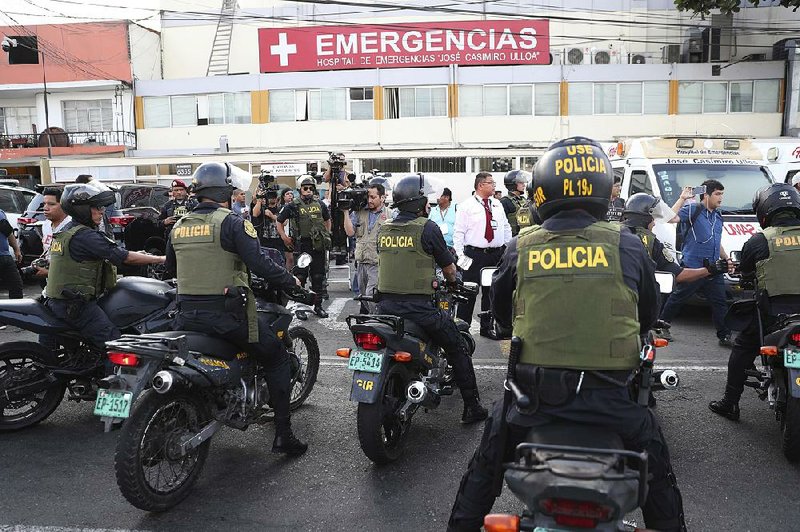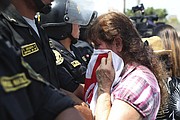LIMA, Peru -- Former Peruvian President Alan Garcia fatally shot himself in the head Wednesday as officers waited to arrest him in a graft investigation that has put the country's most prominent politicians behind bars.
Authorities broke through a door at Garcia's mansion in an upscale neighborhood of the Peruvian capital after hearing gunfire. The 69-year-old former head of state was rushed to a hospital, where doctors performed emergency surgery but could not save him.
"The president, upset over this situation, knowing his absolute innocence ... had this terrible accident," said his lawyer, Erasmo Reyna.
Garcia twice ruled Peru -- once in the 1980s and then again more than two decades later. In more recent years, he became ensnared in Latin America's biggest corruption scandal, a sweeping investigation of politicians' dealings with the Brazilian construction giant known as Odebrecht.
No country outside Brazil has gone as far in prosecuting politicians tied to Odebrecht, which admitted in a 2016 plea agreement that it paid nearly $800 million throughout Latin America in exchange for lucrative public-works contracts.
In Peru, politicians have described the accusations as a political witch hunt. Prosecutors and anti-corruption advocates insist the arrests show the South American nation is holding leaders accountable.
Several leaders called on Peruvians to set aside politics as the nation mourns the former populist firebrand whose second presidency helped usher in a commodities-led investment boom.
"It doesn't matter your political hue, Peru is in mourning," politician Gilbert Violeta wrote on Twitter. "This is a tragedy for our country."
Condolences poured in from throughout the region as leaders recalled a man who at his peak was called the John F. Kennedy of Latin America.
"With virtues and imperfections, he realized great changes that allowed Peru's economy to become one of the fastest-growing in Latin America and in the world," former Mexican President Felipe Calderon said.
Ultimately, though, the former president was an increasingly isolated figure. As investigators closed in, he argued that he was the victim of false testimony about taking bribes from Odebrecht during the construction of Lima's metro. He had not been formally charged.
In December, Garcia sought asylum in the Uruguayan Embassy, staying there for a little more than two weeks before his request was denied. Uruguayan President Tabare Vazquez said there was no evidence to support Garcia's contention he was being politically targeted.
Garcia vowed to cooperate with any investigation and defended himself up to the day before his death.
"I am not mentioned in any document and in any evidence," he wrote Tuesday on Twitter. "They're left to SPECULATE or invent intermediaries. I never sold out and it's proven."
When authorities arrived Wednesday at Garcia's home, they met him on the staircase to the second floor. He asked for a moment to call his attorney, entered another room and closed the door behind him. Moments later, gunfire rang out. Police found him seated, bleeding profusely, Interior Minister Carlos Moran said.
Supporters who had gathered outside the hospital wept as word of his death spread. Some held each other in embrace. Others cried out. A line of officers in helmets and riot shields stood guard, keeping them at a distance.
Garcia was first swept into office on a wave of optimism in 1985 as Latin America's youngest president at age 36. He was hailed as "the president of hope."
Fed by state spending, wage increases and price controls, Garcia's policies initially created an artificial economic boom. But the state coffers were soon drained, credit dried up and investors fled. Labor strikes demanding wage increases in line with soaring inflation crippled production.
As Peru's economy collapsed, Maoist Shining Path guerrillas surged.
Garcia backed the candidacy of an independent political unknown, Alberto Fujimori, in the second-round runoff of the 1990 presidential elections to prevent a win by novelist Mario Vargas Llosa, a conservative rival.
Two years after leaving office, Garcia fled the country as Fujimori's new government pursued corruption charges against him.
On April 5, 1992, Fujimori dissolved Congress, suspended the Peruvian Constitution and sent troops to the home of Garcia, who had been warned of a plot to kill him.
He was smuggled out of his neighborhood in the trunk of a car and eventually made it to the Colombian Embassy, which granted him safe passage from Peru.
During his exile, he split time between Colombia, which granted him asylum, and Paris, where his wife and four children lived.
Garcia was reviled by most Peruvians, who initially tolerated, and even lauded, Fujimori's iron-fisted rule. But in 2000, Fujimori's autocratic government crumbled as corruption scandals mushroomed, creating an opening for Garcia's political comeback. The charges were eventually dropped for lack of evidence.
Garcia returned to his homeland in 2001 to seek re-election, casting himself as an elder statesman who had outgrown leftist ideas. He lost narrowly, but he then set his sights on the 2006 election.
He was widely viewed as the lesser of two evils when he defeated radical nationalist Ollanta Humala in a runoff. But he was determined to regain the trust of Peruvians, telling them, "I am more mature, and I would be an idiot if I were to commit the same mistakes."
His popularity rose as he implemented austerity measures in a nation beset by poverty. He slashed his own salary by more than half and issued decrees forcing lawmakers to reduce their pay by nearly 40 percent.
He also gained praise by starting programs to bring potable water to poor shantytowns and pledged to build roads, schools and health clinics in rural areas.
A Section on 04/18/2019

